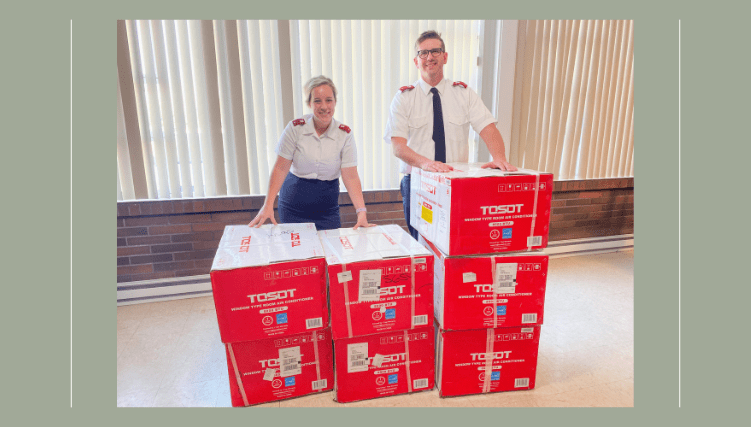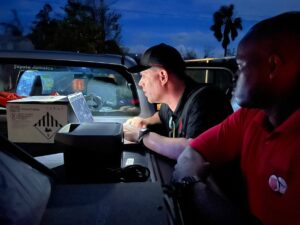As the summer began, so did record-breaking heat for the Pacific Northwest of the U.S., which spans Washington, Oregon, and Idaho. And while warmer weather is expected during this time of the year across the country, high temperatures of this magnitude are unusual for the region—posing great health risks for unprepared residents.
According to the Centers for Disease Control and Prevention (CDC), a heat wave June 25-30 primarily affected Oregon and Washington, with Portland reaching 116 degrees Fahrenheit— 42 degrees warmer than the city’s average daily maximum temperature in June. Hot weather continued in Oregon, Washington, and Idaho through mid-July.
As a result, emergency room visits for heat-related illness in the region significantly increased to 3,504 for May and June, with 79 percent (2,779) of these total visits occurring the week of the heat wave. The extreme heat also led to over 200 deaths across Oregon and Washington.
Salvation Army corps in the Northwest and Cascade divisions in the West were present throughout to offer relief and support to their communities.
In Seattle, The Salvation Army responded to a call from the city and King County to open a cooling shelter at Fisher Pavilion. The efforts are part of an ongoing contract to respond to extreme weather-related emergencies, which are typically for cold weather and smoke in the area.
“We [were] preventing a huge health crisis. If we [didn’t] get these folks properly sheltered and properly cooled, we risk death…overheating and exhaustion,” said Simon Foster, Salvation Army Northwest Division Operations Director.
They opened the air-conditioned cooling shelter for five days, offering 75 beds, dinner, snacks, water and additional wraparound services. Additionally, COVID-19 vaccinations were given to individuals who wanted them.
“It’s in our title—an army. We certainly move like an army. Any time there is a disaster or there’s an emergency or there is a need, we’re readily available and we have the resources to move quickly,” Foster said. “We really move with our hearts. This is not just about a numbers game.”
And while the overwhelming heat was unprecedented in Seattle, The Salvation Army was prepared and hopes to better educate the community on the health risks of heat, so they can seek help earlier.
In Nampa, Idaho, The Salvation Army reopened and extended the hours of the Day Resource Center—which had operated at limited capacity during the pandemic—at its Community Family Shelter to function as a cooling center throughout the summer.
“This is unusual to see it this hot for this long a period of time,” said Margie Potter, Salvation Army Nampa Corps Development and PR Director.
The center is open weekdays from 8 a.m.-5 p.m. for people to eat breakfast, lunch and snacks, access showers, do their laundry and hang out indoors away from the heat. It primarily serves those experiencing homelesssness, but it is open to the community.
“I’m hoping that by them coming in, that they realize that this is a safe place for them to go,” said Katie McMurray, Salvation Army Community Family Shelter Director.
Potter also wants to connect people using the center to additional resources.
“The Salvation Army is about soup, soap, and salvation, so we’re hoping we can give other services and help people beyond just cooling off, getting a meal and cleaning up,” Potter said. “We [want to] help people mentally and spiritually as well.”
In other cities in the Pacific Northwest, The Salvation Army is providing relief from the heat with the help of donors.
The Salvation Army Medford Citadel Corps in Oregon received a $5,000 grant from the Arthur R. Dubs Foundation to purchase approximately 200 box fans to distribute to community members. They have given out nearly 70 fans so far and opened their air-conditioned corps office and social service office as cooling centers.
“The greatest impact is if we help keep people cool and hydrated so they don’t end up in the hospital. But also, sometimes we discount small things that we can do. Sometimes we hear people talk about small acts of kindness. It may seem small and insignificant to us, but to the people who need it at the time, it’s a much-appreciated gesture,” said Major Randy Mulch, Medford Citadel Corps Officer.
“If we can show God’s love to somebody in a small way, it can impact their lives in ways that we don’t even ever see…The mission of The Salvation Army is preaching the gospel and meeting needs in his name and that’s what we’re doing.”
At the Yakima Corps in Washington, an anonymous donor donated seven air conditioning units to give out to households in need.
The corps’ social service office worked to identify existing clients who would be in high need of the air conditioning units, especially those in households with young children, older adults or individuals with existing medical conditions.
“We’re trying to make sure that they go to the families who are really desperately in need of that, especially as we’re looking forward to a very hot summer,” said Lieutenant Meagan Ruff, Yakima Corps Officer. “An air conditioning unit isn’t a quick fix for a week. It should last quite a while, which then, in turn, can help other families be successful in other areas of their life.”
As the hot weather continues, Ruff hopes to open the corps building as a cooling center and distribute popsicles at the local park.
“We don’t just do it for the sake of being The Salvation Army and having our name out there, but we do it because we want people to know Jesus,” Rudd said. We want people to know that God loves them and cares for them no matter where they are [and] no matter what’s going on.”
She wants the corps to be a go-to hub for the community, not just for heat relief but for anything they might need.
“[We want] people [to] see The Salvation Army as a place where they are welcome,” Ruff said. That [way], the community knows they can turn to us no matter what’s going on—that we’re here and we’re here to stay.”
Do Good:
- See how The Salvation Army fights disaster.
- Are you best suited to join the Fight for Good in disaster relief? Mental health? Social justice? Take our What’s Your Cause quiz and discover where you can make the biggest impact today.
- You can make an impact in the Fight for Good with whatever time and skills you have. Whatever your interest, there is a you-sized need for goodness in the world. Get the guide on How To Be An Impactful Volunteer and get in the Fight for Good today.












